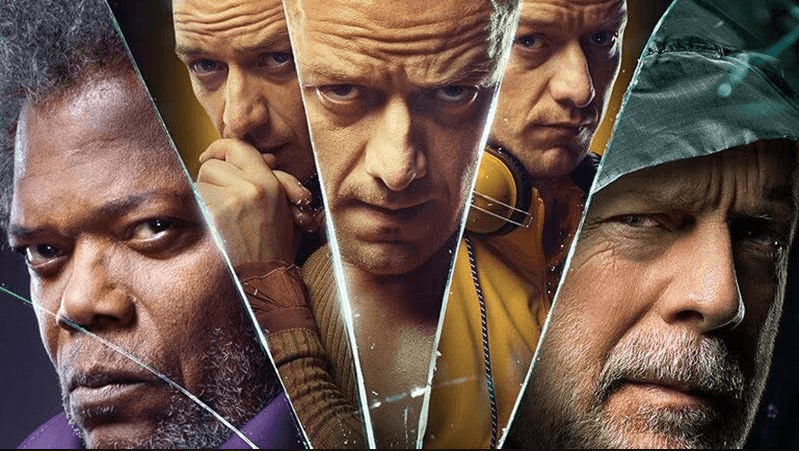Shyamalan’s “Glass” brings reality to superhero movies
6 min read
IMDB
By HARRY FISHER
Online Editor
If you’re a moviegoer, chances are you’ve seen a superhero movie sometime in the last several years. Most of us have probably seen the likes of “Avengers: Infinity War” and “Spider-Man: Into the Spider-verse,” and if you haven’t seen them, you’re at least aware of how popular movies like these are. These movies bring the colorful fantasies of classic comic books to life and charm audiences with their whimsy and sheer spectacle. But fans of director M. Night Shyamalan will remember that he once tried his hand at a superhero film, long before the days of the Marvel Cinematic Universe or even the likes of the Tobey Maguire Spider-Man films. And he’s done it once again with his latest film, “Glass.”
“Glass” is essentially a crossover featuring characters from two of Shyamalan’s most popular films, 2000’s “Unbreakable” and 2016’s “Split.” “Unbreakable” was the story of David Dunn, played by Bruce Willis, who learns throughout the course of the film that he is the real-life equivalent of a superhero. With help from Samuel Jackson’s character Elijah Price, a man with a disease that makes his bones extremely fragile but who also has unrivaled intelligence, David learns that comic books are exaggerated portrayals of real-life events and people. He learns that he has a nearly indestructible body but is weakened by water, and that he has the ability to sense when people have committed horrible crimes so that he can stop them.
However- spoiler warning for those who haven’t seen the movie- he learns at the end that Elijah is a real-life villain character and his evil counterpart, and that he’s killed hundreds of innocent people just to find David so that their story could be complete.
As for “Split,” for most of its runtime it followed the story of Kevin Crumb, a man with dissociative identity disorder, previously and more popularly known as multiple personality disorder. Three of his twenty-three personalities, Dennis, Patricia and Hedwig, sought to awaken his secret twenty-fourth personality, “The Beast,” who could change the physical properties of Kevin’s body to give himself super strength, immunity to bullets and the ability to climb walls.
The Horde, the collection of Kevin’s identities who wished to awaken the Beast, kidnapped three teenage girls for the Beast to feed on, including Casey Cooke, the only one who managed to survive due to the Beast letting her go, believing she was like him. However, the very end of the film revealed that it took place in the same universe as “Unbreakable,” meaning that Kevin, and more specifically the Beast, was another real-life villain just like Elijah.
So, what does all of this have to do with “Glass?” Well, this film is pretty much the conclusion to the story that began with “Unbreakable” way back in 2000 and was continued with “Split.” It brings together all the major characters of the previous two films and brings all of their character arcs to a close. And although I’ve described these films as superhero films, they are vastly different than the epic, action-packed comic book films we’re used to.
The first act of “Glass” focuses on David Dunn and shows us what he’s been doing in the twenty years since he discovered he was a superhero. Cloaked in an old security guard poncho, he goes around stalking criminals and making them pay for hurting innocent people as “the Overseer.” He gets help from his son Joseph, who helped him discover his powers as a child in “Unbreakable.” However, after David gets into a battle with the Beast, both of them are captured by police and taken to the same mental institution where Elijah is being held, after David had him arrested at the end of “Unbreakable.”
Here, we are introduced to Dr. Ellie Staple, a psychiatrist who believes that the main characters have only convinced themselves that they have super powers when they really don’t. From here, the film takes an interesting shift in tone. It becomes more about Dr. Stapler trying to convince David, Elijah and Kevin’s many personalities that they are not comic book characters, and in turn becomes a deconstructive character piece like “Unbreakable.”
During this time, the film focuses more on Kevin and his personalities, as well as his unique relationship with Casey. The final third of the movie then shifts once again, focusing on Elijah and his adoption of the persona “Mr. Glass.” He teams up with the Beast to fulfill their roles as the villains of the story, with David being the hero who has to stop them. I won’t spoil what happens during the finale, but I will say that things get pretty intense.
Some may be wondering how “Glass” fares given Shyamalan’s rather awkward career as a filmmaker. Afterall, he’s famous for fantastic films like “The Sixth Sense” and “Signs,” but equally infamous for disasters like “The Happening” and “After Earth,” just to name a few. However, “Unbreakable” and “Split” were two of his more critically acclaimed films, so the sequel to those movies should be great, right?
Well, I personally found it to be a satisfying conclusion to the character arcs of David Dunn and Elijah Price that were set up in “Unbreakable,” as well as the story of Kevin and Casey from “Split.” The movie has a ton of great character building scenes like “Unbreakable,” and plenty of suspenseful scenes in the style of “Split,” but it still manages to feel unique and have its own tone as well. And of course, the acting was great, which should be expected when the likes of Bruce Willis and Samuel Jackson are part of the equation. But James McAvoy is, in my opinion, the real star of the show, as he does a fantastic job of portraying Kevin Crumb’s many different personalities, each with their own accents, postures and mannerisms, and switching between them on the fly.
Unfortunately, “Glass” isn’t perfect, and I mean that in the sense that it’s not going to satisfy everybody. As the conclusion to the story of these characters that we’ve seen played out across this trilogy, I thought it was great. However, hardcore fans of “Split” probably won’t be completely satisfied with this movie about super powers, since “Split” was more of a psychological thriller. And even die-hard fans of “Unbreakable” may not enjoy the ending of this film and what it does with these beloved characters.
By now, it’s no secret that critics aren’t particularly fond of this movie, and I feel that a lot of the film’s hate is directed at the ending. Again, I won’t spoil what happens, but I will warn those who haven’t seen the movie that die-hard fans of “Unbreakable” probably won’t be fond of the way it ends for the characters of that movie.
Still, one thing that can’t be denied is Shyamalan’s interesting take on the superhero genre. Rather than the fantastical, action-packed blockbusters that we’re used to, Shyamalan has given us a series of super power films that are very much based in reality, giving us a realistic representation of what superpowers could look like and what effect they would have on the lives of the people who received them. The slow pace of the film may be a detriment to some people, especially fans of big budget superhero-action movies, but I think it worked perfectly for this movie that focuses more on characters than on plot or spectacle.
This interesting deconstruction of classic comic book tropes is what made “Unbreakable” a masterpiece almost twenty years ago, and it makes “Glass,” in my opinion, a worthy sequel that’s at least worth checking out if you’re as fascinated with this concept as I am. In a world where we are obsessed with bringing comic books to life, “Unbreakable” and “Glass” try instead to bring reality to comic books.


